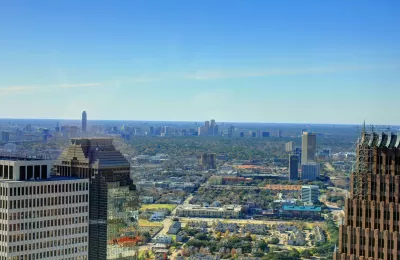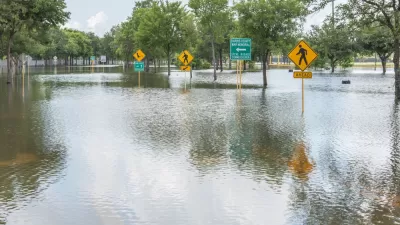Houston's director of Transportation and Drainage Operations wants to see more sustainable development in the city that has historically depended on freeways as its critical infrastructure.

Earlier this year, Houston experienced "one of the worst natural disasters in Texas history as a severe winter storm crippled infrastructure across the state." Veronica O. Davis, the city's new Director of Transportation and Drainage Operations, writes that the city "finds itself at a critical point."
Houston ranks as "one of the nation’s most unsafe for pedestrians and there is a wide gap between neighborhoods’ access to resources," says Davis. "For decades, federal transportation policy has added to these challenges by disproportionately encouraging and subsidizing the growth of one type of transportation infrastructure: highways, which receive 80 percent of federal transportation funding in the U.S." But there is another way. "By offering many ways to get around, we can help reconnect divided neighborhoods, provide more access to opportunity for all Houstonians, lessen racial inequities, and, with less concrete, have our neighborhoods flood less often." Davis says the city is making progress. "With the Resilient Houston plan, we are investing in drainage and green infrastructure to manage stormwater from major and minor storms. And under Mayor Sylvester Turner’s Complete Communities initiative, we are investing in Houston’s under-resourced neighborhoods — right-sizing roads to make them safer for people walking and biking, and working to reduce flooding."
But according to Davis, the city needs help from the federal government. Pointing to a proposal included in the House reconciliation package which includes $10 billion in funding for buses in underserved neighborhoods and "$4 billion to repair the historic damage to Black and low-income neighborhoods caused by highways that intentionally destroyed thriving places and widened segregation," Davis says "these targeted measures could be transformative, tying funding directly to goals, and giving local governments a greater say in what will most benefit their neighborhoods." To make progress on climate change and create a greener, more equitable city, "we must focus on transportation. We must take new approaches." The federal dollars could be a huge step in that direction.
FULL STORY: Opinion: Infrastructure can pave the way to a greener, fairer Houston

Planetizen Federal Action Tracker
A weekly monitor of how Trump’s orders and actions are impacting planners and planning in America.

DARTSpace Platform Streamlines Dallas TOD Application Process
The Dallas transit agency hopes a shorter permitting timeline will boost transit-oriented development around rail stations.

Four Reasons Urban Planners Can’t Ignore AI
It’s no longer a question of whether AI will shape planning, but how. That how is up to us.

Texas State Bills to Defund Dallas Transit Die
DART would have seen a 30% service cut, $230M annual losses had the bills survived.

Bikeshare for the Win: Team Pedals to London Cricket Match, Beats Rivals Stuck in Traffic
While their opponents sat in gridlock, England's national cricket team hopped Lime bikes, riding to a 3-0 victory.

Amtrak’s Borealis Exceeds First Year Ridership Expectations
205,800 passengers have boarded the St. Paul to Chicago line, well above initial MDOT projections.
Urban Design for Planners 1: Software Tools
This six-course series explores essential urban design concepts using open source software and equips planners with the tools they need to participate fully in the urban design process.
Planning for Universal Design
Learn the tools for implementing Universal Design in planning regulations.
City of Mt Shasta
City of Camden Redevelopment Agency
City of Astoria
Transportation Research & Education Center (TREC) at Portland State University
US High Speed Rail Association
City of Camden Redevelopment Agency
Municipality of Princeton (NJ)





























